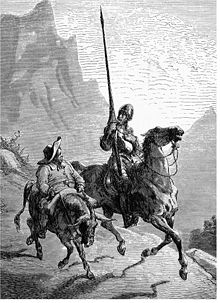- Cuban Spanish
-
Cuban Spanish is the dialect of the Spanish language as it is spoken in Cuba. As a Caribbean dialect, Cuban Spanish shares a number of features with nearby varieties, including coda deletion, seseo, and /s/ debuccalization.
Contents
Overview
Differences with other dialects are most notable in the pronunciation of certain consonants, especially with relation to their syllabic position.
One of the most prominent features of Cuban Spanish is the debuccalization of /s/ in the syllable coda. This trait is shared with many other Caribbean varieties of Spanish,[1] as well as those further away.
Take for example, the following sentence:
- Esos perros no tienen dueños
- [ˈesoh ˈperoh no ˈtjenen ˈdweɲoh]
- ('Those dogs do not have owners')
Also, because /s/ may also be deleted in the syllable coda and because this feature has variable realizations, any or all instances of [h] in the above example may be dropped, potentially rendering [ˈeso ˈpero no ˈtjenen ˈdweɲo]. Other examples: "disfrutar" (to enjoy) is pronounced "difrutar", "fresco" (fresh) becomes "freco". In Havana, "despues" is typically pronounced "depue".
Another instance of lenition, in Cuban Spanish is the deletion of final[2] intervocalic /d/. With intervocalic deletion (e.g. condado [konˈda.o] 'county'). "Tumbado" is pronounced "tumbao".
Another characteristic of Cuban Spanish is the use of the diminutive -ico and -ica instead of the standard -ito and -ita. But this use is restricted to words with -t in the last syllable. For example, plato ('plate') platico instead of platito while cara ('face') becomes carita. This form is common to the Venezuelan, Cuban, Costa Rican and Colombian dialects.
Like in most Socialist states, the term compañero/compañera (meaning "comrade") is used instead of the common señor/señora.
The Cuban Spanish of the eastern provinces (former Oriente) is closer to the Dominican Republic Spanish than to the Spanish spoken in the western part of the island.
Origins of Cuban Spanish
Of all the regional variations of the Spanish language, traditional Cuban Spanish is most similar to, and originates largely from the Spanish spoken in the Canary Islands of Spain. Cuba owes much of its speech patterns to the heavy Canarian migrations, of the 19th and early 20th centuries. Migrations of other Spaniards such as Galicians, Catalans, Basques and Asturians also occurred, though without as considerable an influence.
Much of the typical Cuban replacements for standard Spanish vocabulary stems from Canarian lexicon. For example, guagua ('bus') differs from standard Spanish autobús. The word guagua originated in the Canaries and is an onomatopoeia stemming from the sound of a Klaxon horn. An example of Canarian usage for a Spanish word is the verb fajarse ('to fight').[3] In standard Spanish the verb would be pelearse, while fajar exists as a non-reflexive verb related to the hemming of a skirt.
Much of the vocabulary peculiar to Cuban Spanish comes from the different historic influences on the island. Many words come from the Canary Islands, but some words are of West African, French or indigenous Taino origin, as well as peninsular Spanish influence outside of the Canary Islands, such as Andalusian or Galician. American influence has lent several words such as pulover (which is used to mean "T-shirt") and chor ("shorts", with the typical Spanish change from English 'sh' to 'ch') for clothing. The unique political situation today has led to the development of words which are specific to modern Cuban culture.
Manners
When speaking to the elderly, or to strangers, Cubans speak more formally as a sign of respect. They shake hands upon both greeting and saying farewell to someone. Men often exchange friendly hugs (abrazos) and it is also common for both men and women to greet friends and family with a hug and a kiss on the cheek. Informalities like addressing a stranger with 'mi corazón' (my heart), 'mi vida' (my life), or 'cariño' (dear) are common. "Mi amor" (my love) is used, even between strangers, when at least one of them is a woman (for example when being served in a shop): it is not used between men.
References
- ^ Guitart (1997:515)
- ^ Guitart (1997:515)
- ^ fajar at Diccionario de la Real Academia Española.
Bibliography
- Guitart, Jorge M. (1997), "Variability, multilectalism, and the organization of phonology in Caribbean Spanish dialects", in Martínez-Gil, Fernando, Issues in the Phonology and Morphology of the Major Iberian Languages, Georgetown University Press, pp. 515–536
External links
Dialects and accents of Spanish (Castilian) by continent Africa Americas
(American)Amazonic · Andean · Rioplatense · Cuyano · Bolivian · Chilean · Chilote · Colombian · Ecuadorian · Paraguayan · Peruvian Coastal · VenezuelanAsia Europe
(European)Other / Neutral - Canarian Spanish can be considered both African and European Spanish citing respectively geographical or cultural arguments.
Categories:- Caribbean Spanish
- Cuban culture
Wikimedia Foundation. 2010.

